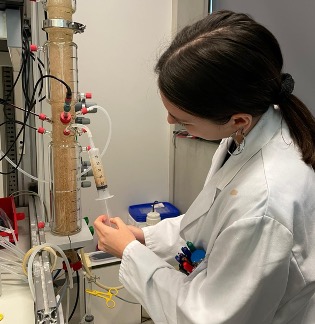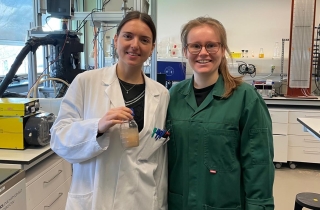SME Call: Entrepreneurs leading the way….
STORY
Building on the momentum of a triumphant start in 2023, the success of Health~Holland's SME call has paved the way for its continuation into 2024. For this reason, a perfect timing to dive deeper into the call. We spoke to Jochem Christiaansen from Health~Holland and Robbert Wever from hollandbio, both involved in the setup of the call from the beginning. In addition, we invited Aisling Foley and Ilaria Poledri, founders of ExCulture B.V. for an interview to talk more about their experience as applicants within the pilot call.
Closing the Gap: Empowering SMEs
Health~Holland has been actively supporting a variety of public-private projects (PPPs) for several years. Typically, these collaborations are led by knowledge institutions that also determine the research. However, this type of research is often not focused on bringing the innovation to the market, resulting in a gap in addressing the needs of innovative Small Medium Enterprises (SMEs; mkb-bedrijven) involved in the PPP. ‘Following an evaluation of Top Sector policy executed by the Ministry of Economic Affairs and Climate Policy and RVO, it became evident that greater integration with SMEs is needed within Life Sciences & Health PPPs,’ explains Jochem. Robbert further explains, ‘To address this concern, Health~Holland and hollandbio convened, posing the question: ‘How can the financial resources of Health~Holland contribute to foster innovation and support SMEs?’ ‘We gain no benefit from fundamental research unless it undergoes further development. Without this progression, it will fail to reach any patients.’ Subsequently, momentum surged.

SME and academic collaboration
‘The subsidy does not go to SMEs in its entirety. By also giving a part to the knowledge institutions, they will continue to participate’, says Jochem. Robbert explains: In a lot of cases, the startup or spin-off is already associated with a knowledge institution and is actively engaged in developing Intellectual Property and/or utilizing knowledge derived from academia. With the SME taking the lead, the focus broadens from fundamental research to enable a transition towards industrial applications.
Available grant
Regarding the available grant, Jochem reveals, ‘In 2023, we launched the pilot SME call with an initial budget of €3.3 million, of which €2.4 million for SMEs.’ However, due to a substantial influx of applications, €6 million was spend. Following the triumph of 2023, the allocation for 2024 was increased to €5 million, with €3.3 million designated for SMEs. Entrepreneurs meeting specified criteria can leverage these funds to secure grants for financing one existing or new full-time equivalent (FTE) dedicated to R&D within an industrial public-private partnership project.
Fine-tuning the call for maximum impact
‘Round one and round two were both pilot calls. We are still fine-tuning,’ says Jochem. He continues, ‘For instance, in round one, we had separate applications for micro and small businesses, as well as for medium and large businesses, a structure we revised in round two. Additionally, we transitioned from four-year projects to only accepting applications for projects lasting up to two years. Moreover, we streamlined the processing timeline by eliminating the low threshold preliminary round and adopting a first-come-first-served basis. Certain alterations were embraced positively, while others were met with less enthusiasm, tells Jochem. ‘The insights and feedback we have received from various parties about the approach of both calls will be taken into account in the development of the next call. ‘I think the aim of the call is to create a model that facilitates submissions with a good quality and focuses on the business model of innovations,’ Robbert adds.
Tips and tricks
Robbert and Jochem emphasize that a successful application hinges on the thorough depiction of research quality and the demonstration of clear economic value, fostering impactful contributions to the Dutch economy and healthcare. ‘Ultimately, the goal of innovative products to reach the market so patients can benefit from the innovations by increasing or optimizing their health,’ underscores Robbert. Jochem elaborates, ‘This aspect is particularly scrutinized by the committee. Aisling and Ilaria from ExCulture penned a strong application, highlighting their company's contributions to both animal and human health as well as sustainability. Undoubtedly, they can offer valuable insights themselves on their experience with the application.’
From academia to entrepreneurship
Aisling Foley and Ilaria Poledri met during their Master's program at Leiden University. During that time, two years ago, their interest in the business side of Life Sciences started growing. When Aisling heard about the need for an external founder to develop a spin-out of the Environmental Biotechnology Department of TU Delft with a biopharmaceutical focus the ExCulture’s mission to become the global pioneers of mixed culture fermentation for the efficient and reliable production of complex novel biopharmaceuticals started. Together with Ilaria, Aisling took on the responsibility, aiming to bring this innovation to the market.
ExCulture's Sustainable Solution for a Vital Medicine
ExCulture has developed a proprietary, natural, mixed-culture fermentation bioprocess to produce an animal-free alternative to the world’s most commonly used blood thinner, heparin. Since Heparin is a byproduct of pig-slaughter, the way it is produced is unsustainable. ‘We hope that through our innovation, we can establish a more efficient and, ideally, safer method of accessing this medication. Heparin stands as the most frequently utilized blood thinner among hospitalized patients, with approximately one in three requiring it. However, there has been an ongoing global shortage for about seven years,’ Aisling explains.
From Venture Challenge to applying for the SME call
In 2023, ExCulture won the LifeSciences@Work Venture Challenge. In this program, LSH startups get guidance to develop a solid business case out of their initial idea. Concurrently, they applied for the pre-proposal of the SME call. ‘The pre-proposal did not take a lot of time, however the proposal itself was a bit more complex,' says Ilaria. She adds: ‘As coordinator of the project, we had to manage all the parties involved: Leiden University Medical Center (LUMC) -Center for Proteomics and Metabolomics (CPM), Good Biomarker Sciences (GBS) and Department of Experimental Cardiology at Erasmus MC, meaning we were accountable for overseeing everyone's activities for the project and assigning their respective tasks within the work packages.’
‘The application form was very long: approximately 70 pages. Yet, we understood the necessity for such detail, given GBS's, the LUMC and EMC’s prior involvement in similar calls. This familiarity enabled us to craft a robust proposal aligned with the commission's expectations,’ explains Ilaria. Aisling contributes, ‘calls like the SME call hold significant importance and can significantly bolster startup companies. Nonetheless, we question whether our application would have fared as successfully without the expertise of our seasoned Consortium project members. I think many applicants would benefit from a guideline or sample template for writing their proposal.’
The near future
‘We started renting a lab space in DSM Planet B.io, where we will move to this summer. Besides, last December we also hired someone who will help us with the tech transfer', says Ilaria. She adds: 'The subsidy from the SME call comes at a great timing, it will generate a lot of progress and increase our understanding of this animal-free alternative heparin; including the production of the compounds, testing and validation according to the project pipeline.’ Part of the budget will also go towards machinery such as the bioreactor. ‘We hope that in the near future, all of this will have helped us get another step closer to replacing heparin derived from animals,’ concludes Aisling.


